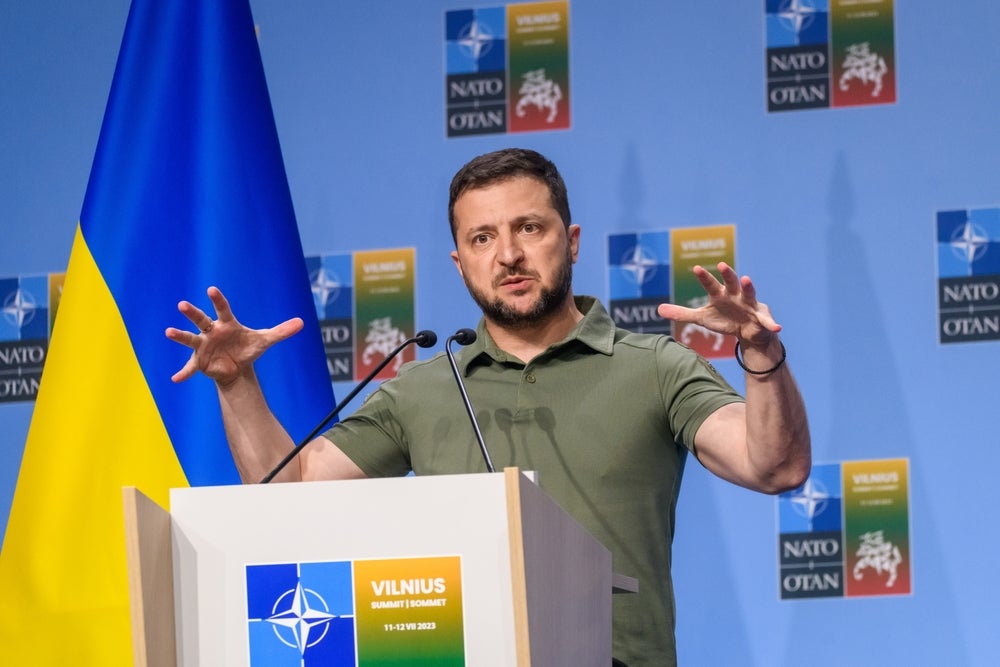
As the two-day Nato summit in Vilnius draws to a close, President Zelensky has softened his criticism for European and North American member states’ hesitancy to admit Ukraine.
Article 5 of Nato’s charter obliges members to defend each other if attacked. Were Ukraine to join during the current conflict with Russia, all Nato nations would have to declare war on Russia.
Yesterday (July 11), Zelensky made allegations that there was “no readiness” to invite Ukraine, calling the lack of clarity “unprecedented and absurd”.
Following today’s talks, Zelensky was far more conciliatory about the outcome of the summit, saying he understood the delay because “nobody is willing to have a world war”.
Russia reacts mockingly as Nato calls for patience
Nato’s official line is that Ukraine will become a member “when allies agree and conditions are met”. Speaking at a press conference earlier this afternoon, Secretary General Jens Stoltenberg went a step further to say Ukraine is “closer to Nato than ever before”.
But Zelensky, tweeting prior to Stoltenberg’s comments, implied Nato was withholding Ukraine’s membership as a bargaining chip in talks with Moscow. He said “a window of opportunity is being left to bargain Ukraine’s membership in Nato in negotiations with Russia. And for Russia, this means motivation to continue its terror. Uncertainty is weakness”.
Russian state television has capitalised on the disagreements to portray the summit as a total failure for Kyiv.
While the VGTRK (the All-Russia State Television and Radio Broadcasting Company) has been gloating about Ukraine’s delayed accession, G7’s long-term security guarantees for Ukraine have elicited a more threatening response. Dmitry Peskov, Vladimir Putin’s spokesperson, told the BBC it would be a mistake and very dangerous for any country to offer security guarantees to Ukraine.
Meanwhile, government newspaper Rossiyskaya Gazeta (Russian Gazette) bolstered the Kremlin narrative that Nato is an offensive, rather than responsive, military alliance set on destroying Russia. The front page said Nato is on the “war path” and returning to “Cold War schemes”.
While refraining from any specific timeline, Nato has outlined the possibility of Ukraine skipping a step in the Membership Action Plan – the entry process followed by other member countries, most recently including North Macedonia in 2020 and Finland in April.
The potential fast-track of Ukraine’s request will be closely scrutinised by Bosnia and Herzegovina, Sweden and Georgia, which have all declared aspirations for Nato membership.
UK Defence Secretary tells Ukraine to show “gratitude”
Held in Lithuania’s capital, the summit was attended by leaders from all 31 Nato member states.
UK Defence Secretary Ben Wallace urged Kyiv to show more “gratitude” following Zelensky’s comments and renewed weapons requests. Wallace emphasised the billions of dollars’ worth of weapons western states have funnelled into Ukraine’s war efforts, saying “we’re not Amazon”.
Since the start of 2022, the UK has provided $6.6 billion in military assistance for Ukraine, surpassed in bilateral military aid only by the US ($42.8 billion) and Germany ($7.5 billion). But, despite Wallace’s remarks, Rishi Sunak has tweeted his strong support for Ukraine’s Nato accession, while Biden promised Zelensky “we’re going to make sure you get what you need.”



